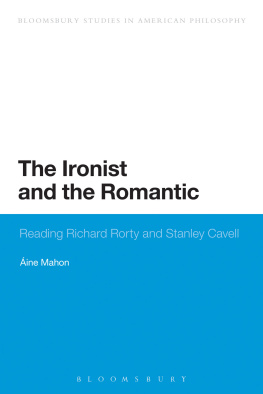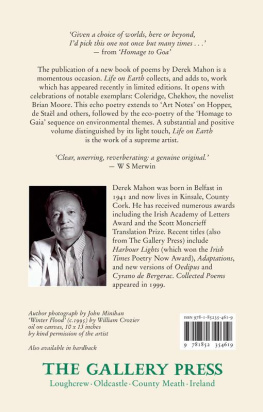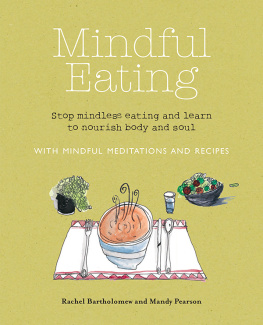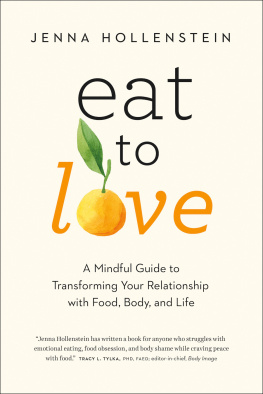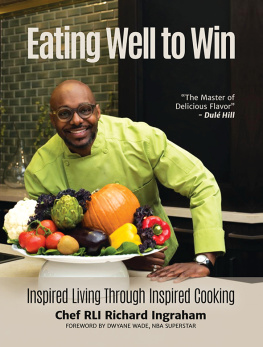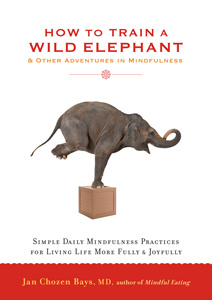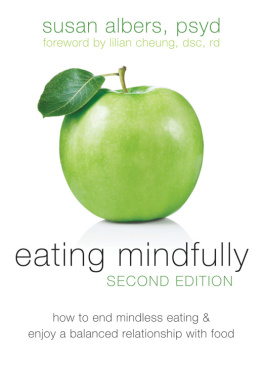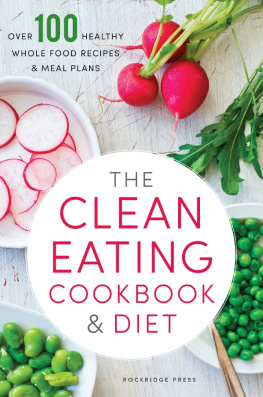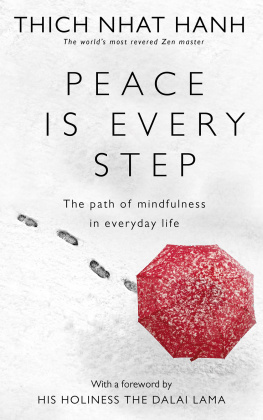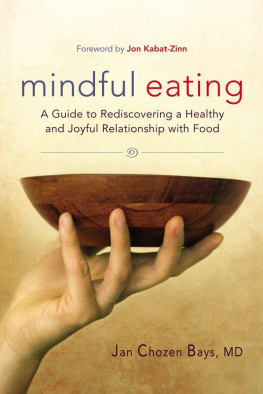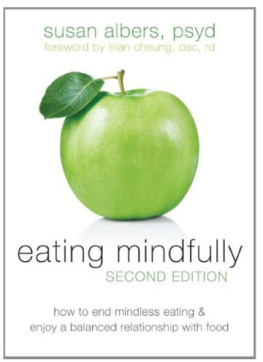This is a marvelous book, so real and realistic, around the issues of food and solutions in how to meet what we eat with care and mindfulness. Annie Mahon has offered us not only recipes for eating but recipes for living. I am so grateful.
Roshi Joan Halifax, Abbot, Upaya Zen Center
Beautifully written and compulsively readable, this book is a feast of compassion for the struggling, weak, suffering sides of us. Its heaped full of comfort and practical help for anyone who struggles with painful emotions, self-doubt, and the desperate urge to not feel what we are feeling. Highly recommended, with a deep bow.
Ann Weiser Cornell, The Radical Acceptance of Everything and Presence
With courage and humility, Mahon reminds us that foodrather than being fraught with disconnection and discontentcan help us come to our senses. As we cook and eat, she gently encourages us to listen to our bodies, to reclaim our original natures, and to recall our deep and intimate membership in the wider world.
Tovar Cerulli, The Mindful Carnivore
Annies compassionate writing addresses an issue of struggle for so manyevery day eating. Through the sharing of her journey and struggles, youll gain insight into your own relationship with food, discover ways to work with disordered eating, and learn practical tips to adjust your palate and habits for overall well-being.
Kimberly Wilson, Tranquility du Jour Anthology and Tranquilista
Take one raw, hilarious, searingly honest, and compulsively readable memoir; fold in a wise, compassionate guide to mindful eating; and blend it with a delicious vegetarian cookbook. Thats the recipe for Annie Mahons nutritious new book Things I Did When I Was Hangry. Whether you devour it in one sitting or savor it for days in small bites, this book is a feast for the spirit.
Anne Cushman, Moving into Meditation
Things I Did When I Was Hangry


To my mom and dad without whom my world would not exist. And to all of the women and men who suffer because of their relationship with food.
Contents
An Ingredients Origin Shapes Its Flavor
Keep Trying Until You Get It Right
Discovering Unusual Techniques for Dealing with an Eating Disorder
Trying New Tastes and Sharing Mindfulness Practice with My Family
My Childrens Struggles with Food and Learning the Value of Community
How to Figure Out Whats Eating You
Making a Deeper Commitment to Mindfulness Practice, Community, and the Proper Way to Hug
Lessons from My Ancestors, and the Path to Freedom
I WROTE THIS BOOK BECAUSE I didnt really know how or what to eat until I began practicing mindfulness. Once I did, I became aware of how many others experience suffering around eating as well. I hope this story, of one familys experience, will help. It has been more challenging for me to be joyfully present in my kitchen than in any other room of my house. My goal for the last two decades has been to relearn how to nourish myself with food. Mindfulness has been my best teacher.
Eating is not a winning game, but if it were, I would never win the award for Most Mindful Eater. I might, however, win for Most Improved, or maybe Valuable Team Player. I have overcome a pattern of eating disorders and held the hand of several friends and relatives as they walked various paths to healing their own eating disorders. Along the way, my relationship with food and cooking changed.
The basic practice of mindful cooking and eating is this: In each moment, if your mind wanders away from what youre doing, pause, breathe, and return your attention to your physical experience, whether its preparing food or eating it. Its really that simple.
I had dinner a year ago with a woman who is considered an expert on mindful eating. In the weeks leading up to our meal, I worried about her seeing that I wasnt a real mindful eater. Fortunately, my companion didnt seem to notice when I overloaded my fork or talked with my mouth full. We simply enjoyed our conversation and our food. I realized that this was an example of how I had wasted years of my life worrying about what and how I would eat, judging myself and expecting others to judge me too. This habit has kept me from enjoying my food and my life more times than I can count. Mindfulness has not dissolved this habit, but it has made me more aware of it, and now this worrying happens much less often.
The aim of practicing mindful cooking and eating is to increase the joy of cooking and eating. When I mentioned to a friend that I was writing this book, she assumed that I cook every meal at home joyfully and eat every meal with my family in mindful bliss. She thought I might judge her way of cooking and eating because it wasnt like that. Wrong. It isnt the end of the world if my family orders in pizza, has pancakes for dinner, or talks nonstop through a meal. Its okay if we dont agree about food and what to eat. There isnt a right way to do it, and it doesnt help anyone to be judged for how and where they eat.
These days, I rarely obsess about what to cook and eat. I eat mostly intuitively and enjoy taking care of myself and my loved ones by creating and eating healthy meals that taste good. I still work on remembering to cook with awareness and to eat sitting down without distractions. Theres a saying that resentment is like drinking poison and hoping the other person will die. My relationship with food has been like this: I was angry at food for its power over me, and so I ate it without enjoying it. Of course, the one who suffered was me.
When I was a young child, I was much more in touch with my food. I remember enjoying the look and smell of green peas as they rolled around my plate, their texture when I squished them with the back of my fork, and how it seemed to take forever to finish the one spoonful I had been served.
But, like many of us, my upbringing, my genes, and the cultural pressures of the times conspired to change my relationship with preparing and eating food. By the time I reached puberty, I was already unable to enjoy eating because of my preoccupation with my weight. Preparing food wasnt as interesting either; I had other, seemingly more important, things to do. I no longer listened to what my body wanted and needed to eat.
As I got older, life got busier and I had even less time for cooking and eating. I began to eat out more often or to buy food that was processed or prepared. I was lost more often in my mind rather than experiencing life through my senses in the present moment. To begin the process of transformation, I had to be able to stop running around, stop distracting myself, stop thinking so much about food, and start experiencing food the way I had as a child.
I have been very lucky to have had enough food to eat throughout my life, while many people in this world have not. The idea of bingeing, purging, or purposeful starving would be incomprehensible to some people living in the world now, and certainly to a lot of our less well-off ancestors. As I reflect on the difficulties that my family and I have experienced around food, I am also reminded over and over again of how extremely fortunate we have been to have each other and to have all the resources that we need to survive.
Lastly, in addition to my mindfulness meditation and yoga practices, I have had the benefit of a good therapist through the years who has specifically helped me around eating disorders. Im not sure I would have been able to make the changes I have without the time I spent with her.
Next page

